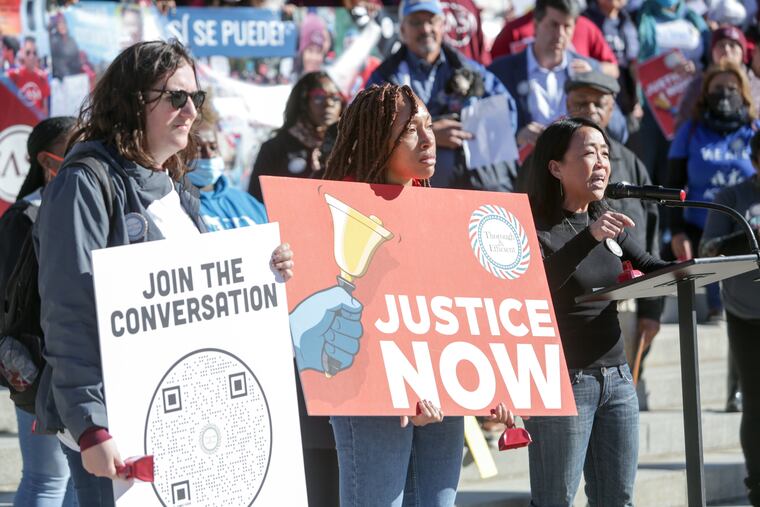Kids on the supposed ‘McDonald’s track’ are living in a rigged system | Opinion
This characterization — and the ongoing inequities in state school funding — is deeply unfair.

Imagine a baking competition — the Great Pennsylvania Bake-Off — where contestants must bake the best cake. Contestant A is given cookbooks, state-of-the-art equipment, and a fully stocked pantry. Contestant B receives one grocery bag of expired ingredients, no recipes, and an Easy-Bake Oven. When A’s beautiful cake wins, one commentator says it’s a shame B didn’t try harder, and another remarks, “Not everyone needs cake, anyway.”
While viewers would be outraged at such unfairness, these rigged conditions aren’t very different from those of Pennsylvania’s grossly inequitable education system, which systematically starves poor districts of resources despite a constitutional mandate to provide a “thorough and efficient” education to all students. Amid a historic school funding trial currently playing out in Harrisburg, lawmakers are defending the inequitable status quo with strikingly similar remarks.
» READ MORE: 7 takeaways from the first week of Pennsylvania’s landmark school funding trial
A recent analysis found Pennsylvania’s schools are underfunded by at least $4.6 billion. But the inadequacy isn’t equally distributed: students of color and those experiencing poverty are much more likely to attend underfunded schools. While research has shown students in high-poverty districts need more resources to succeed, Pennsylvania’s regressive funding system provides less to those who need the most: the wealthiest school districts spend $4,800 more per student than the poorest districts. The 100 most underfunded districts (the bottom 20%) represent over half of Pennsylvania’s Black and brown students, students experiencing poverty, and English learners.
The biggest reason for these disparities is simple: insufficient state investment in education. Pennsylvania gives relatively little state funding to K-12 education — a smaller percentage than 44 other states, to be exact — which forces local communities to front the rest, exacerbating inequities between rich and poor districts. Like the Great Pennsylvania Bake-Off, we give students from poor districts dramatically inferior inputs (larger class sizes, old and unsafe buildings, fewer support staff and course offerings), but expect them to achieve the same outputs (test scores and graduation rates) as their wealthy peers. Is it any surprise that Pennsylvania has some of our country’s widest racial and socioeconomic achievement gaps?
State lawmakers haven’t really tried to claim the funding system provides equitable resources. Instead, they’ve resorted to blaming poor students for inferior outcomes and questioning whether they really need comprehensive education. When discussing disparities in resources and outcomes between high- and low-wealth districts, a lawyer for House Speaker Bryan Cutler said “some students are better equipped to take advantage of opportunities offered or perhaps are more industrious.” A lawyer for Senate President Pro Tempore Jake Corman asked a rural superintendent, “What use would someone on the McDonald’s career track have for Algebra 1?” before concluding, “There’s a need for retail workers, for people who know how to flip a pizza crust.”
While the indifferent cruelty of such comments is stunning — would these lawmakers accept their own children being denied Algebra 1 and shuttled onto the pizza crust track? — we can’t ignore the racial and socioeconomic subtext, given the correlation between school funding and race and class. The history of denying poor people and people of color educational opportunities dates to our country’s founding, when enslaved people were prohibited from learning to read and Thomas Jefferson envisioned a whites-only education system that would bestow a publicly funded education only on top students who were “raked from the rubbish.” The idea that people of color only need to be educated for menial jobs has also persisted over time.
As a former educator who taught in the underfunded Philadelphia public schools, I’ve taught — and loved — the students dismissed by lawmakers as less “industrious” and destined for the “McDonald’s track.” I’ve seen their curiosity, brilliance, ambition, and work ethic: Verónica, who dreamed of becoming a scientist and inventing new vaccines and miracle drugs; Bryan, who worked multiple jobs and still completed every homework assignment; Josh and Cashey, who started their own lunchtime book club to nerd out about their favorite pleasure reads. I’ve also seen the obstacles placed in their way, both by external factors like poverty and gun violence as well as the school system itself, which provides them fewer resources and opportunities than their peers in wealthier suburbs.
“If we believe in fairness and opportunity for all students — as both a moral necessity and an economic one — then unrigging Pennsylvania’s school funding system should be an urgent priority.”
If we believe in fairness and opportunity for all students — as both a moral necessity and an economic one — then unrigging Pennsylvania’s school funding system should be an urgent priority. Lawmakers don’t need to wait for a lawsuit verdict to stop blaming students for the state’s failures and do the right thing. This budget season, Gov. Tom Wolf and the General Assembly can begin to address the $4.6 billion adequacy shortfall by investing $1.5 billion in education and directing a significant portion of that money to the 100 most underfunded districts through the Level Up program.
The stakes are much higher than a bake-off. Every Pennsylvania student deserves a level playing field and an equal chance to pursue their dreams.
Laura Boyce is a former teacher and principal and serves as Pennsylvania executive director of Teach Plus. lboyce@teachplus.org